Organizational Behavior: Team Dynamics, Motivation, and Culture
VerifiedAdded on 2021/02/19
|17
|6206
|94
Report
AI Summary
This report analyzes organizational behavior, focusing on the impact of culture, power, and politics on team dynamics and individual performance within a business context. Using Marks & Spencer as a case study, it explores how different organizational cultures (power, role, task, and person) influence business operations. The report delves into motivational theories, including expectancy and equity theories, and content theories like Maslow's Hierarchy of Needs, to understand how to enhance employee motivation and achieve business goals. It also examines the factors that contribute to effective and ineffective teams, along with philosophies and concepts of organizational behavior that impact individual actions within a workplace setting. The report critically evaluates the relationships between culture, politics, power, and motivation to improve team performance, and provides a comprehensive overview of how these elements affect business outcomes.
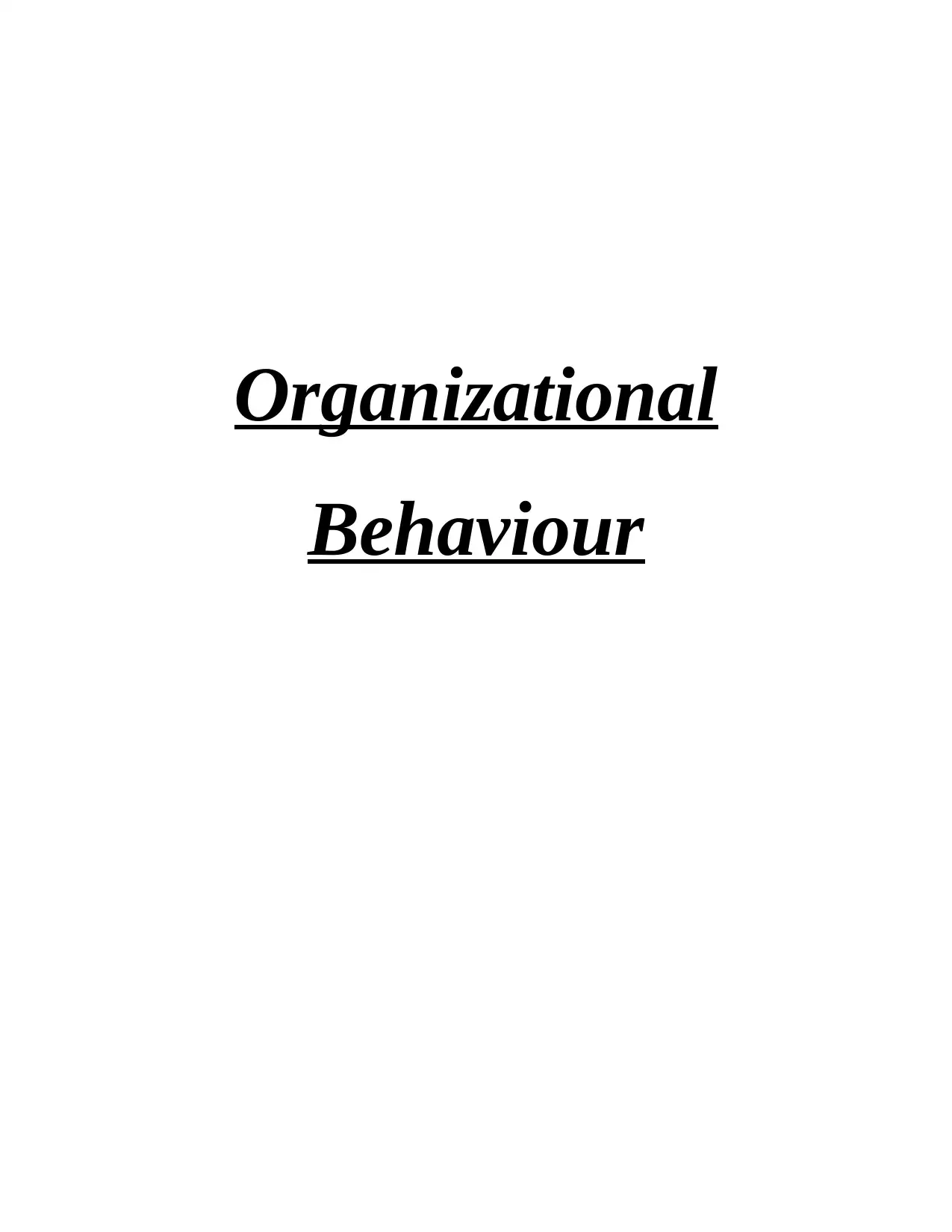
Organizational
Behaviour
Behaviour
Paraphrase This Document
Need a fresh take? Get an instant paraphrase of this document with our AI Paraphraser
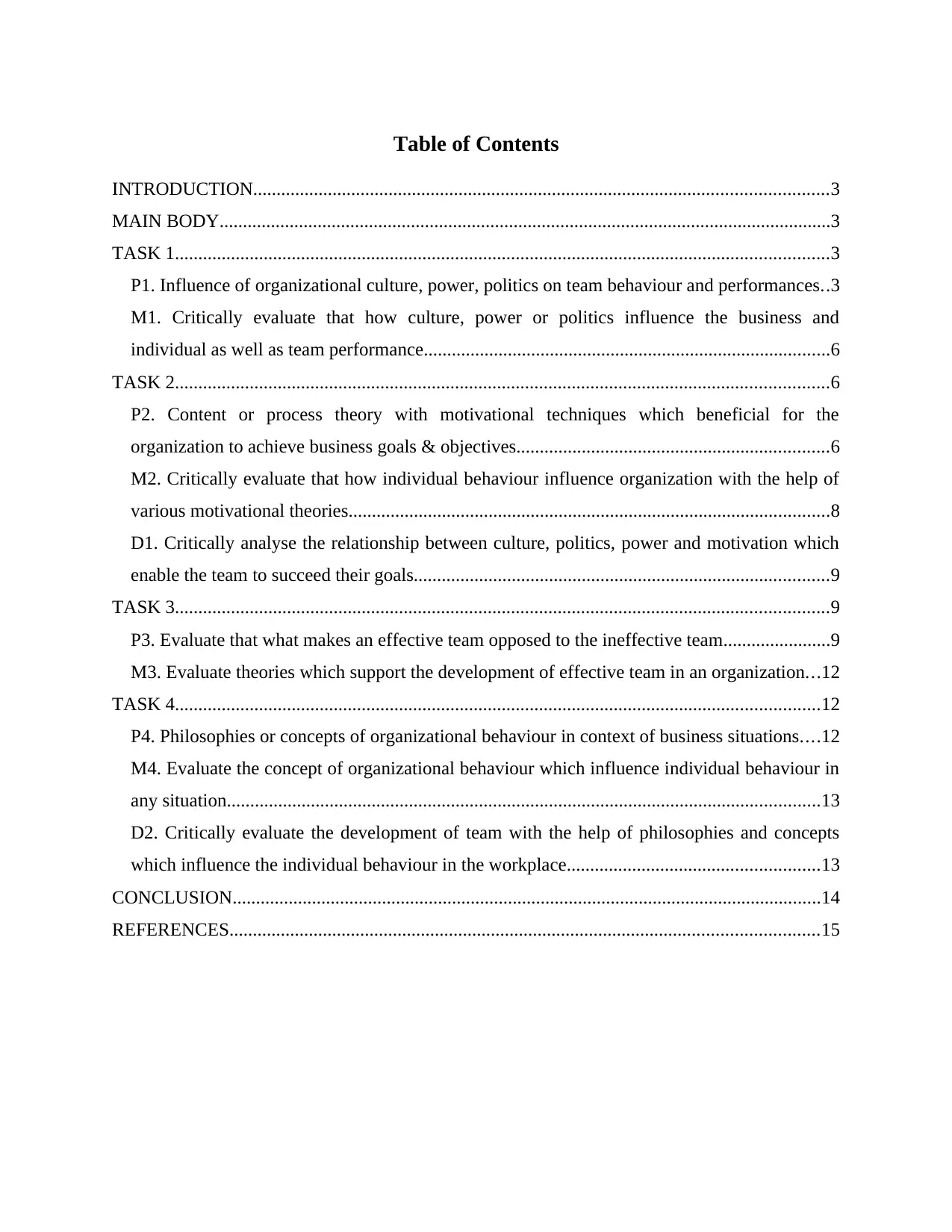
Table of Contents
INTRODUCTION...........................................................................................................................3
MAIN BODY...................................................................................................................................3
TASK 1............................................................................................................................................3
P1. Influence of organizational culture, power, politics on team behaviour and performances..3
M1. Critically evaluate that how culture, power or politics influence the business and
individual as well as team performance.......................................................................................6
TASK 2............................................................................................................................................6
P2. Content or process theory with motivational techniques which beneficial for the
organization to achieve business goals & objectives...................................................................6
M2. Critically evaluate that how individual behaviour influence organization with the help of
various motivational theories.......................................................................................................8
D1. Critically analyse the relationship between culture, politics, power and motivation which
enable the team to succeed their goals.........................................................................................9
TASK 3............................................................................................................................................9
P3. Evaluate that what makes an effective team opposed to the ineffective team.......................9
M3. Evaluate theories which support the development of effective team in an organization...12
TASK 4..........................................................................................................................................12
P4. Philosophies or concepts of organizational behaviour in context of business situations....12
M4. Evaluate the concept of organizational behaviour which influence individual behaviour in
any situation...............................................................................................................................13
D2. Critically evaluate the development of team with the help of philosophies and concepts
which influence the individual behaviour in the workplace......................................................13
CONCLUSION..............................................................................................................................14
REFERENCES..............................................................................................................................15
INTRODUCTION...........................................................................................................................3
MAIN BODY...................................................................................................................................3
TASK 1............................................................................................................................................3
P1. Influence of organizational culture, power, politics on team behaviour and performances..3
M1. Critically evaluate that how culture, power or politics influence the business and
individual as well as team performance.......................................................................................6
TASK 2............................................................................................................................................6
P2. Content or process theory with motivational techniques which beneficial for the
organization to achieve business goals & objectives...................................................................6
M2. Critically evaluate that how individual behaviour influence organization with the help of
various motivational theories.......................................................................................................8
D1. Critically analyse the relationship between culture, politics, power and motivation which
enable the team to succeed their goals.........................................................................................9
TASK 3............................................................................................................................................9
P3. Evaluate that what makes an effective team opposed to the ineffective team.......................9
M3. Evaluate theories which support the development of effective team in an organization...12
TASK 4..........................................................................................................................................12
P4. Philosophies or concepts of organizational behaviour in context of business situations....12
M4. Evaluate the concept of organizational behaviour which influence individual behaviour in
any situation...............................................................................................................................13
D2. Critically evaluate the development of team with the help of philosophies and concepts
which influence the individual behaviour in the workplace......................................................13
CONCLUSION..............................................................................................................................14
REFERENCES..............................................................................................................................15
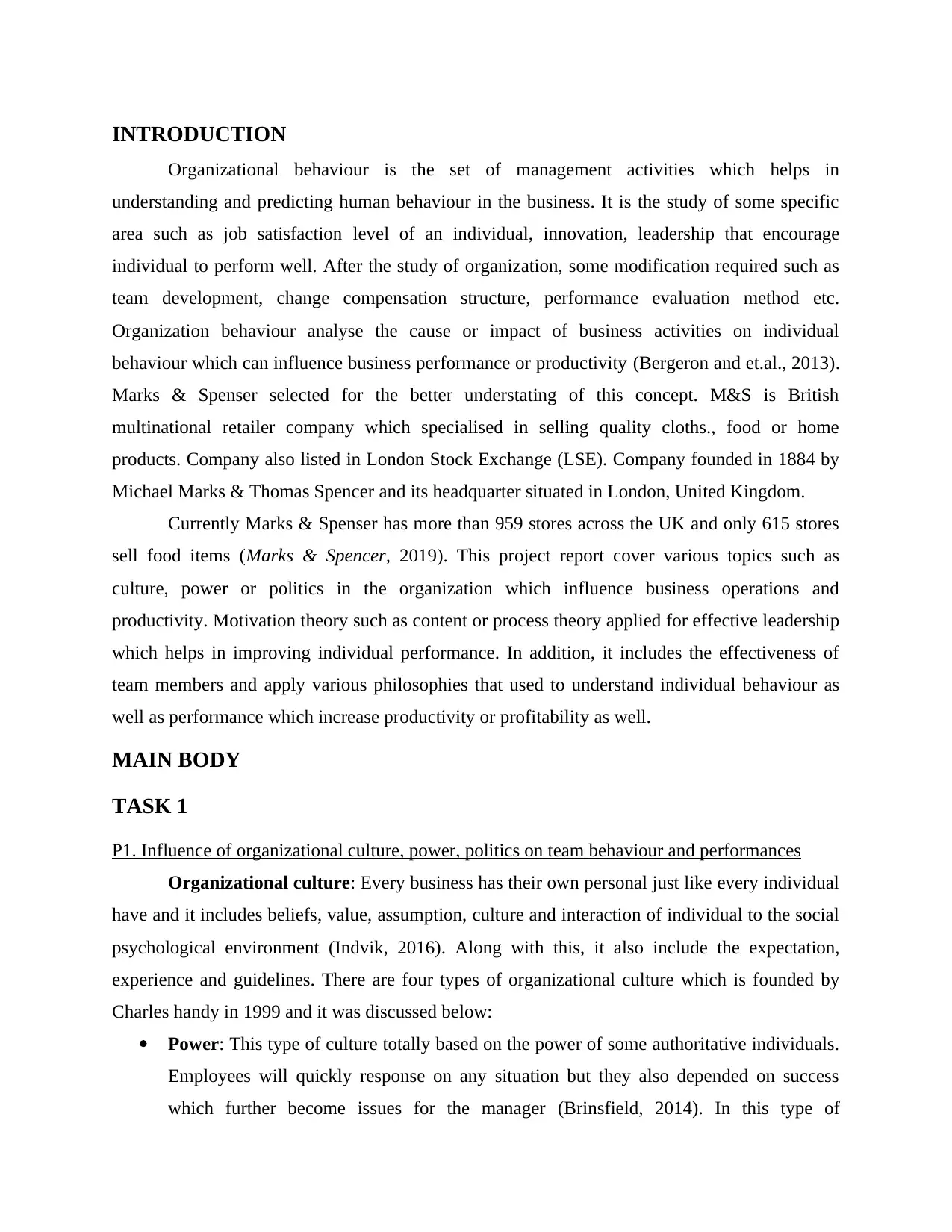
INTRODUCTION
Organizational behaviour is the set of management activities which helps in
understanding and predicting human behaviour in the business. It is the study of some specific
area such as job satisfaction level of an individual, innovation, leadership that encourage
individual to perform well. After the study of organization, some modification required such as
team development, change compensation structure, performance evaluation method etc.
Organization behaviour analyse the cause or impact of business activities on individual
behaviour which can influence business performance or productivity (Bergeron and et.al., 2013).
Marks & Spenser selected for the better understating of this concept. M&S is British
multinational retailer company which specialised in selling quality cloths., food or home
products. Company also listed in London Stock Exchange (LSE). Company founded in 1884 by
Michael Marks & Thomas Spencer and its headquarter situated in London, United Kingdom.
Currently Marks & Spenser has more than 959 stores across the UK and only 615 stores
sell food items (Marks & Spencer, 2019). This project report cover various topics such as
culture, power or politics in the organization which influence business operations and
productivity. Motivation theory such as content or process theory applied for effective leadership
which helps in improving individual performance. In addition, it includes the effectiveness of
team members and apply various philosophies that used to understand individual behaviour as
well as performance which increase productivity or profitability as well.
MAIN BODY
TASK 1
P1. Influence of organizational culture, power, politics on team behaviour and performances
Organizational culture: Every business has their own personal just like every individual
have and it includes beliefs, value, assumption, culture and interaction of individual to the social
psychological environment (Indvik, 2016). Along with this, it also include the expectation,
experience and guidelines. There are four types of organizational culture which is founded by
Charles handy in 1999 and it was discussed below:
Power: This type of culture totally based on the power of some authoritative individuals.
Employees will quickly response on any situation but they also depended on success
which further become issues for the manager (Brinsfield, 2014). In this type of
Organizational behaviour is the set of management activities which helps in
understanding and predicting human behaviour in the business. It is the study of some specific
area such as job satisfaction level of an individual, innovation, leadership that encourage
individual to perform well. After the study of organization, some modification required such as
team development, change compensation structure, performance evaluation method etc.
Organization behaviour analyse the cause or impact of business activities on individual
behaviour which can influence business performance or productivity (Bergeron and et.al., 2013).
Marks & Spenser selected for the better understating of this concept. M&S is British
multinational retailer company which specialised in selling quality cloths., food or home
products. Company also listed in London Stock Exchange (LSE). Company founded in 1884 by
Michael Marks & Thomas Spencer and its headquarter situated in London, United Kingdom.
Currently Marks & Spenser has more than 959 stores across the UK and only 615 stores
sell food items (Marks & Spencer, 2019). This project report cover various topics such as
culture, power or politics in the organization which influence business operations and
productivity. Motivation theory such as content or process theory applied for effective leadership
which helps in improving individual performance. In addition, it includes the effectiveness of
team members and apply various philosophies that used to understand individual behaviour as
well as performance which increase productivity or profitability as well.
MAIN BODY
TASK 1
P1. Influence of organizational culture, power, politics on team behaviour and performances
Organizational culture: Every business has their own personal just like every individual
have and it includes beliefs, value, assumption, culture and interaction of individual to the social
psychological environment (Indvik, 2016). Along with this, it also include the expectation,
experience and guidelines. There are four types of organizational culture which is founded by
Charles handy in 1999 and it was discussed below:
Power: This type of culture totally based on the power of some authoritative individuals.
Employees will quickly response on any situation but they also depended on success
which further become issues for the manager (Brinsfield, 2014). In this type of
⊘ This is a preview!⊘
Do you want full access?
Subscribe today to unlock all pages.

Trusted by 1+ million students worldwide
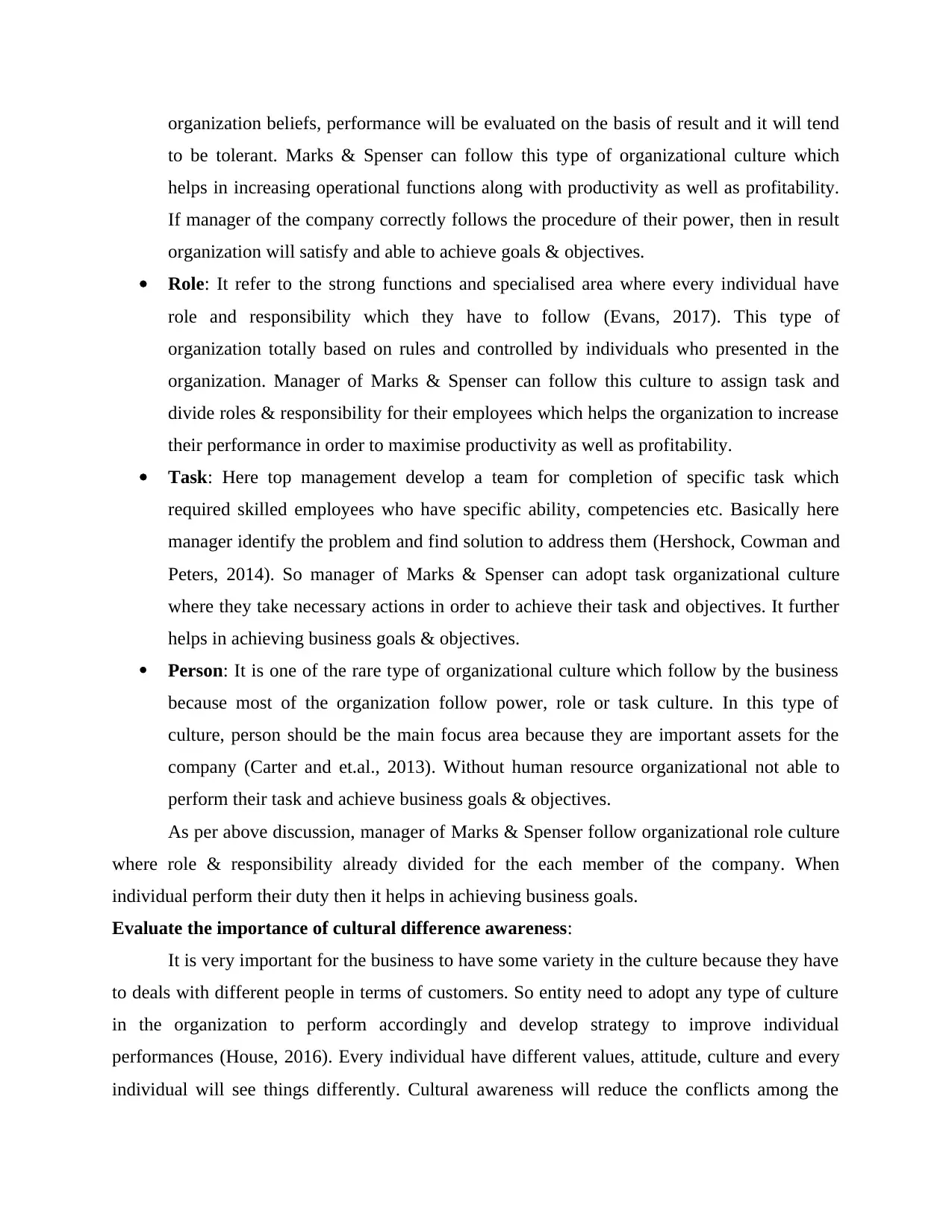
organization beliefs, performance will be evaluated on the basis of result and it will tend
to be tolerant. Marks & Spenser can follow this type of organizational culture which
helps in increasing operational functions along with productivity as well as profitability.
If manager of the company correctly follows the procedure of their power, then in result
organization will satisfy and able to achieve goals & objectives.
Role: It refer to the strong functions and specialised area where every individual have
role and responsibility which they have to follow (Evans, 2017). This type of
organization totally based on rules and controlled by individuals who presented in the
organization. Manager of Marks & Spenser can follow this culture to assign task and
divide roles & responsibility for their employees which helps the organization to increase
their performance in order to maximise productivity as well as profitability.
Task: Here top management develop a team for completion of specific task which
required skilled employees who have specific ability, competencies etc. Basically here
manager identify the problem and find solution to address them (Hershock, Cowman and
Peters, 2014). So manager of Marks & Spenser can adopt task organizational culture
where they take necessary actions in order to achieve their task and objectives. It further
helps in achieving business goals & objectives.
Person: It is one of the rare type of organizational culture which follow by the business
because most of the organization follow power, role or task culture. In this type of
culture, person should be the main focus area because they are important assets for the
company (Carter and et.al., 2013). Without human resource organizational not able to
perform their task and achieve business goals & objectives.
As per above discussion, manager of Marks & Spenser follow organizational role culture
where role & responsibility already divided for the each member of the company. When
individual perform their duty then it helps in achieving business goals.
Evaluate the importance of cultural difference awareness:
It is very important for the business to have some variety in the culture because they have
to deals with different people in terms of customers. So entity need to adopt any type of culture
in the organization to perform accordingly and develop strategy to improve individual
performances (House, 2016). Every individual have different values, attitude, culture and every
individual will see things differently. Cultural awareness will reduce the conflicts among the
to be tolerant. Marks & Spenser can follow this type of organizational culture which
helps in increasing operational functions along with productivity as well as profitability.
If manager of the company correctly follows the procedure of their power, then in result
organization will satisfy and able to achieve goals & objectives.
Role: It refer to the strong functions and specialised area where every individual have
role and responsibility which they have to follow (Evans, 2017). This type of
organization totally based on rules and controlled by individuals who presented in the
organization. Manager of Marks & Spenser can follow this culture to assign task and
divide roles & responsibility for their employees which helps the organization to increase
their performance in order to maximise productivity as well as profitability.
Task: Here top management develop a team for completion of specific task which
required skilled employees who have specific ability, competencies etc. Basically here
manager identify the problem and find solution to address them (Hershock, Cowman and
Peters, 2014). So manager of Marks & Spenser can adopt task organizational culture
where they take necessary actions in order to achieve their task and objectives. It further
helps in achieving business goals & objectives.
Person: It is one of the rare type of organizational culture which follow by the business
because most of the organization follow power, role or task culture. In this type of
culture, person should be the main focus area because they are important assets for the
company (Carter and et.al., 2013). Without human resource organizational not able to
perform their task and achieve business goals & objectives.
As per above discussion, manager of Marks & Spenser follow organizational role culture
where role & responsibility already divided for the each member of the company. When
individual perform their duty then it helps in achieving business goals.
Evaluate the importance of cultural difference awareness:
It is very important for the business to have some variety in the culture because they have
to deals with different people in terms of customers. So entity need to adopt any type of culture
in the organization to perform accordingly and develop strategy to improve individual
performances (House, 2016). Every individual have different values, attitude, culture and every
individual will see things differently. Cultural awareness will reduce the conflicts among the
Paraphrase This Document
Need a fresh take? Get an instant paraphrase of this document with our AI Paraphraser
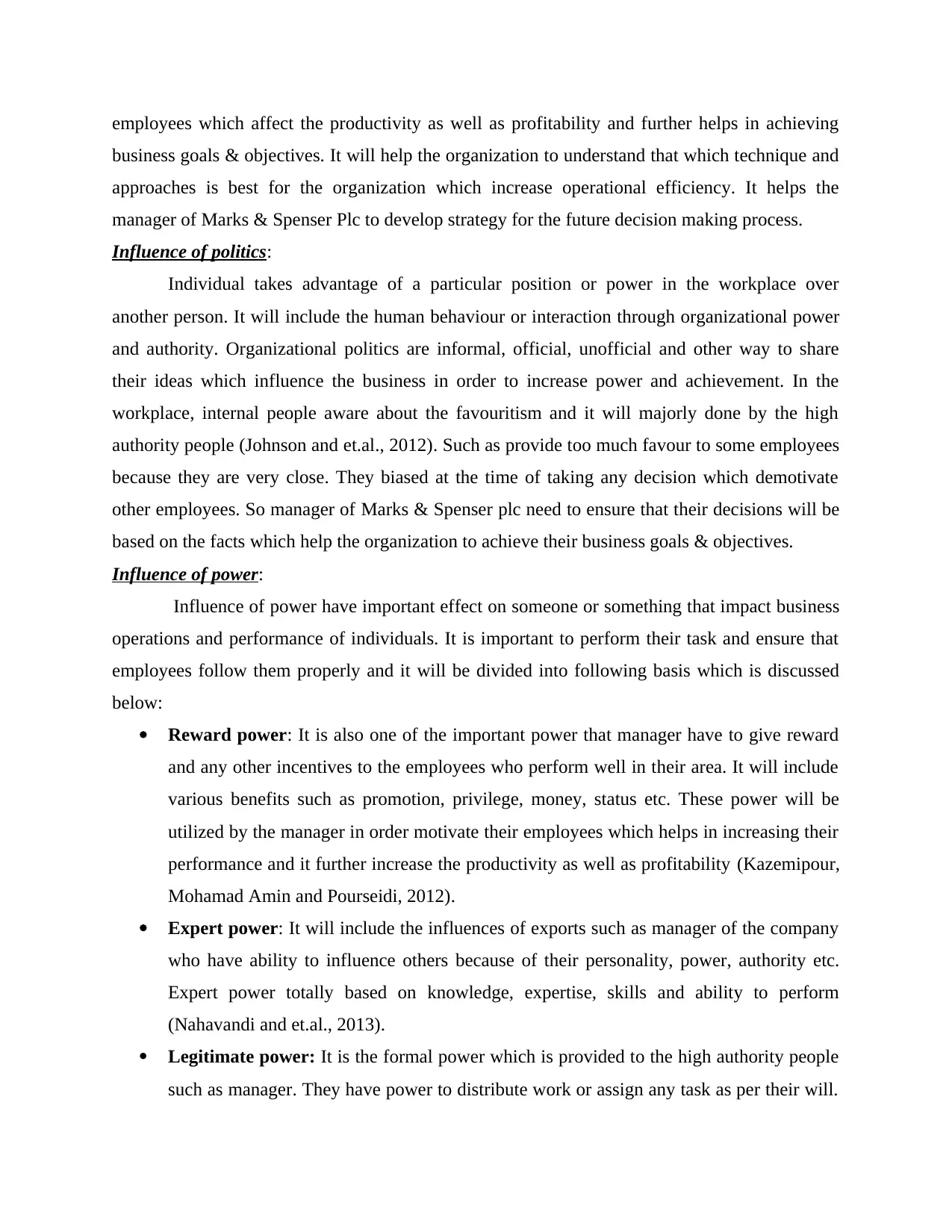
employees which affect the productivity as well as profitability and further helps in achieving
business goals & objectives. It will help the organization to understand that which technique and
approaches is best for the organization which increase operational efficiency. It helps the
manager of Marks & Spenser Plc to develop strategy for the future decision making process.
Influence of politics:
Individual takes advantage of a particular position or power in the workplace over
another person. It will include the human behaviour or interaction through organizational power
and authority. Organizational politics are informal, official, unofficial and other way to share
their ideas which influence the business in order to increase power and achievement. In the
workplace, internal people aware about the favouritism and it will majorly done by the high
authority people (Johnson and et.al., 2012). Such as provide too much favour to some employees
because they are very close. They biased at the time of taking any decision which demotivate
other employees. So manager of Marks & Spenser plc need to ensure that their decisions will be
based on the facts which help the organization to achieve their business goals & objectives.
Influence of power:
Influence of power have important effect on someone or something that impact business
operations and performance of individuals. It is important to perform their task and ensure that
employees follow them properly and it will be divided into following basis which is discussed
below:
Reward power: It is also one of the important power that manager have to give reward
and any other incentives to the employees who perform well in their area. It will include
various benefits such as promotion, privilege, money, status etc. These power will be
utilized by the manager in order motivate their employees which helps in increasing their
performance and it further increase the productivity as well as profitability (Kazemipour,
Mohamad Amin and Pourseidi, 2012).
Expert power: It will include the influences of exports such as manager of the company
who have ability to influence others because of their personality, power, authority etc.
Expert power totally based on knowledge, expertise, skills and ability to perform
(Nahavandi and et.al., 2013).
Legitimate power: It is the formal power which is provided to the high authority people
such as manager. They have power to distribute work or assign any task as per their will.
business goals & objectives. It will help the organization to understand that which technique and
approaches is best for the organization which increase operational efficiency. It helps the
manager of Marks & Spenser Plc to develop strategy for the future decision making process.
Influence of politics:
Individual takes advantage of a particular position or power in the workplace over
another person. It will include the human behaviour or interaction through organizational power
and authority. Organizational politics are informal, official, unofficial and other way to share
their ideas which influence the business in order to increase power and achievement. In the
workplace, internal people aware about the favouritism and it will majorly done by the high
authority people (Johnson and et.al., 2012). Such as provide too much favour to some employees
because they are very close. They biased at the time of taking any decision which demotivate
other employees. So manager of Marks & Spenser plc need to ensure that their decisions will be
based on the facts which help the organization to achieve their business goals & objectives.
Influence of power:
Influence of power have important effect on someone or something that impact business
operations and performance of individuals. It is important to perform their task and ensure that
employees follow them properly and it will be divided into following basis which is discussed
below:
Reward power: It is also one of the important power that manager have to give reward
and any other incentives to the employees who perform well in their area. It will include
various benefits such as promotion, privilege, money, status etc. These power will be
utilized by the manager in order motivate their employees which helps in increasing their
performance and it further increase the productivity as well as profitability (Kazemipour,
Mohamad Amin and Pourseidi, 2012).
Expert power: It will include the influences of exports such as manager of the company
who have ability to influence others because of their personality, power, authority etc.
Expert power totally based on knowledge, expertise, skills and ability to perform
(Nahavandi and et.al., 2013).
Legitimate power: It is the formal power which is provided to the high authority people
such as manager. They have power to distribute work or assign any task as per their will.
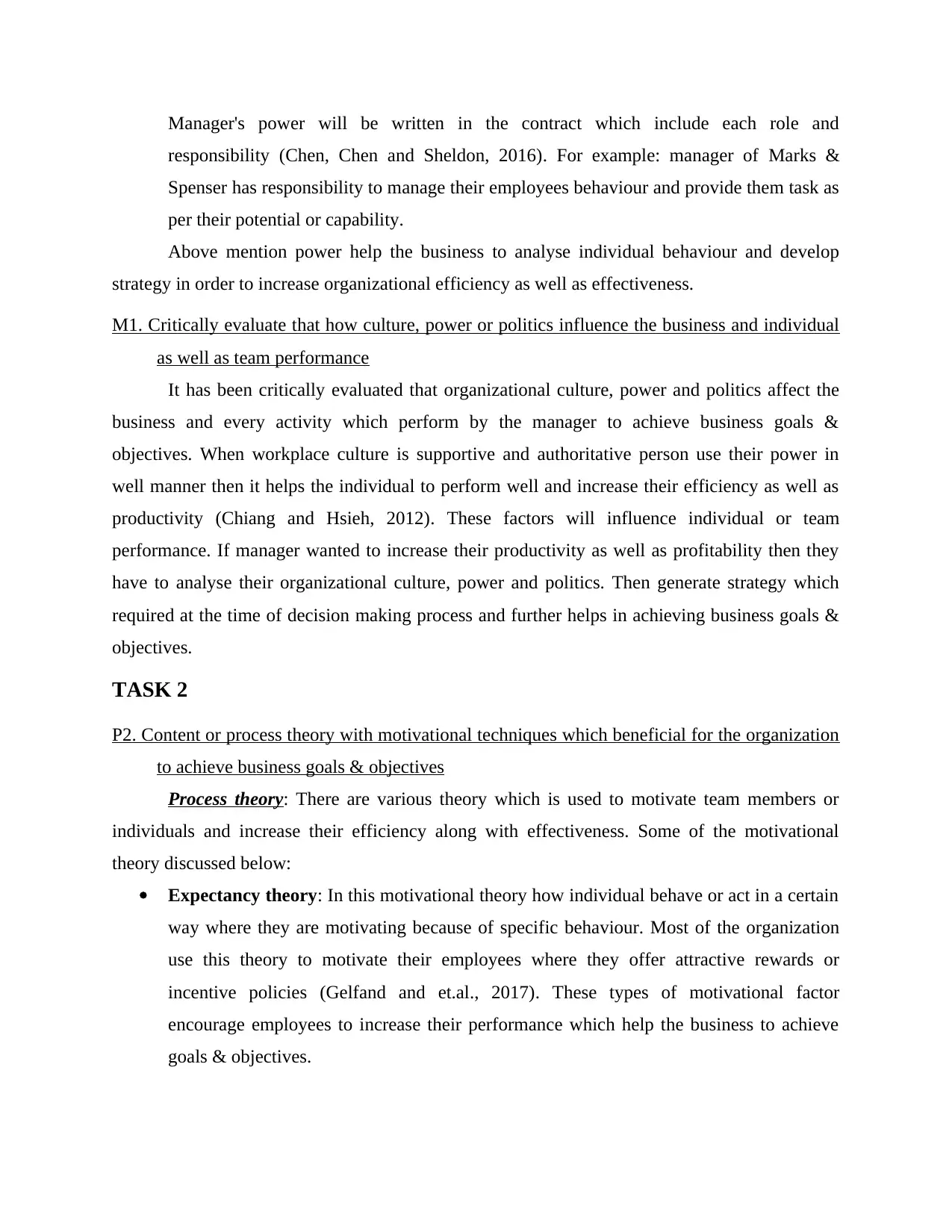
Manager's power will be written in the contract which include each role and
responsibility (Chen, Chen and Sheldon, 2016). For example: manager of Marks &
Spenser has responsibility to manage their employees behaviour and provide them task as
per their potential or capability.
Above mention power help the business to analyse individual behaviour and develop
strategy in order to increase organizational efficiency as well as effectiveness.
M1. Critically evaluate that how culture, power or politics influence the business and individual
as well as team performance
It has been critically evaluated that organizational culture, power and politics affect the
business and every activity which perform by the manager to achieve business goals &
objectives. When workplace culture is supportive and authoritative person use their power in
well manner then it helps the individual to perform well and increase their efficiency as well as
productivity (Chiang and Hsieh, 2012). These factors will influence individual or team
performance. If manager wanted to increase their productivity as well as profitability then they
have to analyse their organizational culture, power and politics. Then generate strategy which
required at the time of decision making process and further helps in achieving business goals &
objectives.
TASK 2
P2. Content or process theory with motivational techniques which beneficial for the organization
to achieve business goals & objectives
Process theory: There are various theory which is used to motivate team members or
individuals and increase their efficiency along with effectiveness. Some of the motivational
theory discussed below:
Expectancy theory: In this motivational theory how individual behave or act in a certain
way where they are motivating because of specific behaviour. Most of the organization
use this theory to motivate their employees where they offer attractive rewards or
incentive policies (Gelfand and et.al., 2017). These types of motivational factor
encourage employees to increase their performance which help the business to achieve
goals & objectives.
responsibility (Chen, Chen and Sheldon, 2016). For example: manager of Marks &
Spenser has responsibility to manage their employees behaviour and provide them task as
per their potential or capability.
Above mention power help the business to analyse individual behaviour and develop
strategy in order to increase organizational efficiency as well as effectiveness.
M1. Critically evaluate that how culture, power or politics influence the business and individual
as well as team performance
It has been critically evaluated that organizational culture, power and politics affect the
business and every activity which perform by the manager to achieve business goals &
objectives. When workplace culture is supportive and authoritative person use their power in
well manner then it helps the individual to perform well and increase their efficiency as well as
productivity (Chiang and Hsieh, 2012). These factors will influence individual or team
performance. If manager wanted to increase their productivity as well as profitability then they
have to analyse their organizational culture, power and politics. Then generate strategy which
required at the time of decision making process and further helps in achieving business goals &
objectives.
TASK 2
P2. Content or process theory with motivational techniques which beneficial for the organization
to achieve business goals & objectives
Process theory: There are various theory which is used to motivate team members or
individuals and increase their efficiency along with effectiveness. Some of the motivational
theory discussed below:
Expectancy theory: In this motivational theory how individual behave or act in a certain
way where they are motivating because of specific behaviour. Most of the organization
use this theory to motivate their employees where they offer attractive rewards or
incentive policies (Gelfand and et.al., 2017). These types of motivational factor
encourage employees to increase their performance which help the business to achieve
goals & objectives.
⊘ This is a preview!⊘
Do you want full access?
Subscribe today to unlock all pages.

Trusted by 1+ million students worldwide
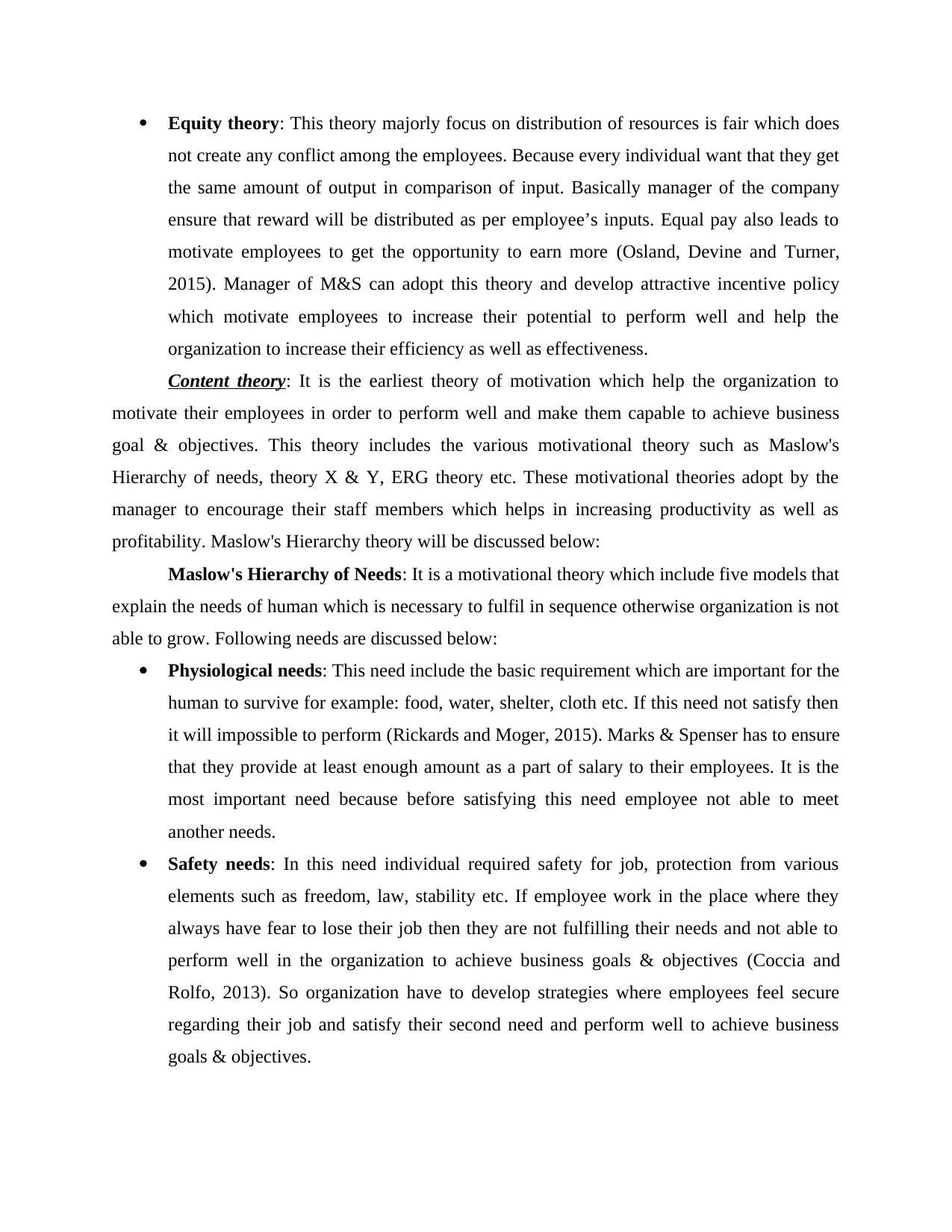
Equity theory: This theory majorly focus on distribution of resources is fair which does
not create any conflict among the employees. Because every individual want that they get
the same amount of output in comparison of input. Basically manager of the company
ensure that reward will be distributed as per employee’s inputs. Equal pay also leads to
motivate employees to get the opportunity to earn more (Osland, Devine and Turner,
2015). Manager of M&S can adopt this theory and develop attractive incentive policy
which motivate employees to increase their potential to perform well and help the
organization to increase their efficiency as well as effectiveness.
Content theory: It is the earliest theory of motivation which help the organization to
motivate their employees in order to perform well and make them capable to achieve business
goal & objectives. This theory includes the various motivational theory such as Maslow's
Hierarchy of needs, theory X & Y, ERG theory etc. These motivational theories adopt by the
manager to encourage their staff members which helps in increasing productivity as well as
profitability. Maslow's Hierarchy theory will be discussed below:
Maslow's Hierarchy of Needs: It is a motivational theory which include five models that
explain the needs of human which is necessary to fulfil in sequence otherwise organization is not
able to grow. Following needs are discussed below:
Physiological needs: This need include the basic requirement which are important for the
human to survive for example: food, water, shelter, cloth etc. If this need not satisfy then
it will impossible to perform (Rickards and Moger, 2015). Marks & Spenser has to ensure
that they provide at least enough amount as a part of salary to their employees. It is the
most important need because before satisfying this need employee not able to meet
another needs.
Safety needs: In this need individual required safety for job, protection from various
elements such as freedom, law, stability etc. If employee work in the place where they
always have fear to lose their job then they are not fulfilling their needs and not able to
perform well in the organization to achieve business goals & objectives (Coccia and
Rolfo, 2013). So organization have to develop strategies where employees feel secure
regarding their job and satisfy their second need and perform well to achieve business
goals & objectives.
not create any conflict among the employees. Because every individual want that they get
the same amount of output in comparison of input. Basically manager of the company
ensure that reward will be distributed as per employee’s inputs. Equal pay also leads to
motivate employees to get the opportunity to earn more (Osland, Devine and Turner,
2015). Manager of M&S can adopt this theory and develop attractive incentive policy
which motivate employees to increase their potential to perform well and help the
organization to increase their efficiency as well as effectiveness.
Content theory: It is the earliest theory of motivation which help the organization to
motivate their employees in order to perform well and make them capable to achieve business
goal & objectives. This theory includes the various motivational theory such as Maslow's
Hierarchy of needs, theory X & Y, ERG theory etc. These motivational theories adopt by the
manager to encourage their staff members which helps in increasing productivity as well as
profitability. Maslow's Hierarchy theory will be discussed below:
Maslow's Hierarchy of Needs: It is a motivational theory which include five models that
explain the needs of human which is necessary to fulfil in sequence otherwise organization is not
able to grow. Following needs are discussed below:
Physiological needs: This need include the basic requirement which are important for the
human to survive for example: food, water, shelter, cloth etc. If this need not satisfy then
it will impossible to perform (Rickards and Moger, 2015). Marks & Spenser has to ensure
that they provide at least enough amount as a part of salary to their employees. It is the
most important need because before satisfying this need employee not able to meet
another needs.
Safety needs: In this need individual required safety for job, protection from various
elements such as freedom, law, stability etc. If employee work in the place where they
always have fear to lose their job then they are not fulfilling their needs and not able to
perform well in the organization to achieve business goals & objectives (Coccia and
Rolfo, 2013). So organization have to develop strategies where employees feel secure
regarding their job and satisfy their second need and perform well to achieve business
goals & objectives.
Paraphrase This Document
Need a fresh take? Get an instant paraphrase of this document with our AI Paraphraser
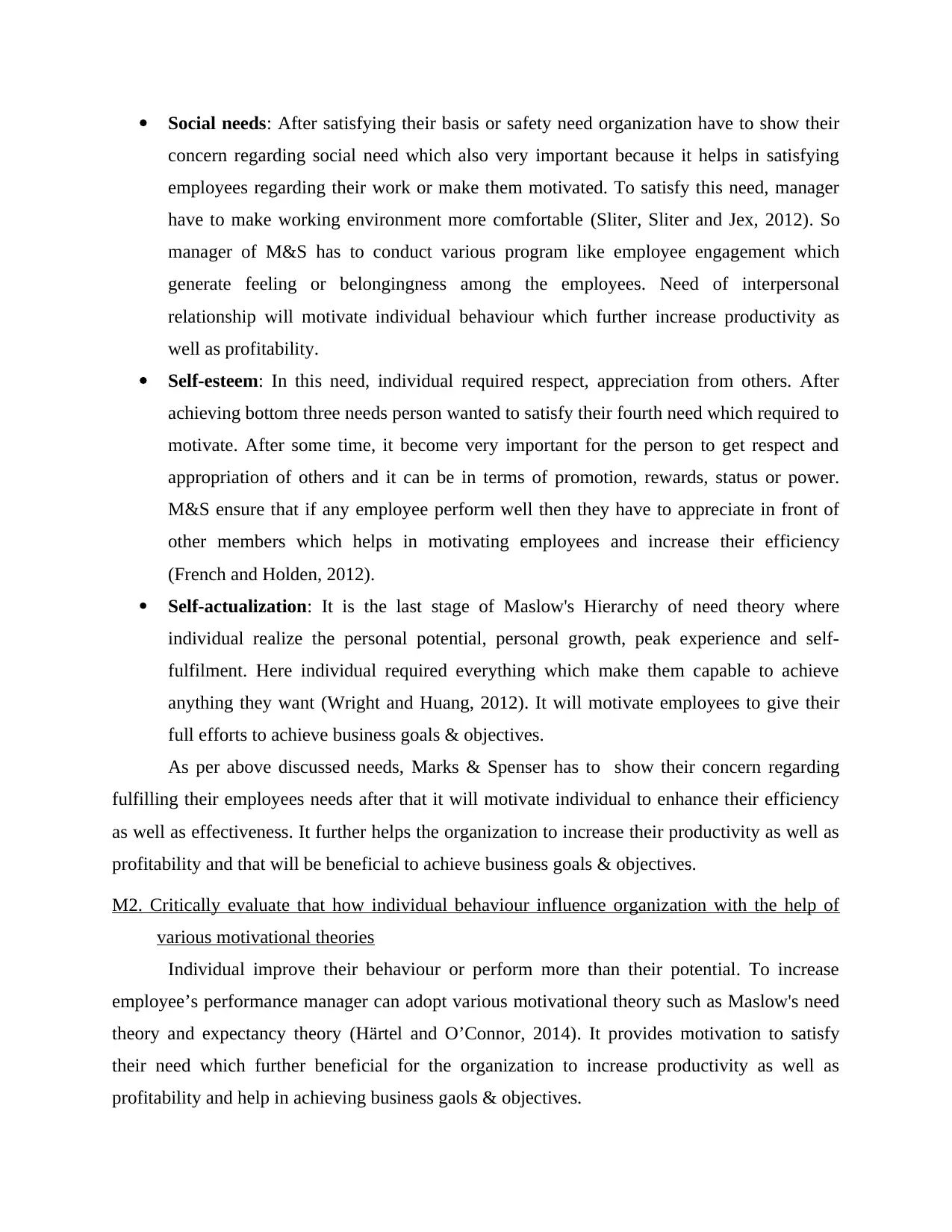
Social needs: After satisfying their basis or safety need organization have to show their
concern regarding social need which also very important because it helps in satisfying
employees regarding their work or make them motivated. To satisfy this need, manager
have to make working environment more comfortable (Sliter, Sliter and Jex, 2012). So
manager of M&S has to conduct various program like employee engagement which
generate feeling or belongingness among the employees. Need of interpersonal
relationship will motivate individual behaviour which further increase productivity as
well as profitability.
Self-esteem: In this need, individual required respect, appreciation from others. After
achieving bottom three needs person wanted to satisfy their fourth need which required to
motivate. After some time, it become very important for the person to get respect and
appropriation of others and it can be in terms of promotion, rewards, status or power.
M&S ensure that if any employee perform well then they have to appreciate in front of
other members which helps in motivating employees and increase their efficiency
(French and Holden, 2012).
Self-actualization: It is the last stage of Maslow's Hierarchy of need theory where
individual realize the personal potential, personal growth, peak experience and self-
fulfilment. Here individual required everything which make them capable to achieve
anything they want (Wright and Huang, 2012). It will motivate employees to give their
full efforts to achieve business goals & objectives.
As per above discussed needs, Marks & Spenser has to show their concern regarding
fulfilling their employees needs after that it will motivate individual to enhance their efficiency
as well as effectiveness. It further helps the organization to increase their productivity as well as
profitability and that will be beneficial to achieve business goals & objectives.
M2. Critically evaluate that how individual behaviour influence organization with the help of
various motivational theories
Individual improve their behaviour or perform more than their potential. To increase
employee’s performance manager can adopt various motivational theory such as Maslow's need
theory and expectancy theory (Härtel and O’Connor, 2014). It provides motivation to satisfy
their need which further beneficial for the organization to increase productivity as well as
profitability and help in achieving business gaols & objectives.
concern regarding social need which also very important because it helps in satisfying
employees regarding their work or make them motivated. To satisfy this need, manager
have to make working environment more comfortable (Sliter, Sliter and Jex, 2012). So
manager of M&S has to conduct various program like employee engagement which
generate feeling or belongingness among the employees. Need of interpersonal
relationship will motivate individual behaviour which further increase productivity as
well as profitability.
Self-esteem: In this need, individual required respect, appreciation from others. After
achieving bottom three needs person wanted to satisfy their fourth need which required to
motivate. After some time, it become very important for the person to get respect and
appropriation of others and it can be in terms of promotion, rewards, status or power.
M&S ensure that if any employee perform well then they have to appreciate in front of
other members which helps in motivating employees and increase their efficiency
(French and Holden, 2012).
Self-actualization: It is the last stage of Maslow's Hierarchy of need theory where
individual realize the personal potential, personal growth, peak experience and self-
fulfilment. Here individual required everything which make them capable to achieve
anything they want (Wright and Huang, 2012). It will motivate employees to give their
full efforts to achieve business goals & objectives.
As per above discussed needs, Marks & Spenser has to show their concern regarding
fulfilling their employees needs after that it will motivate individual to enhance their efficiency
as well as effectiveness. It further helps the organization to increase their productivity as well as
profitability and that will be beneficial to achieve business goals & objectives.
M2. Critically evaluate that how individual behaviour influence organization with the help of
various motivational theories
Individual improve their behaviour or perform more than their potential. To increase
employee’s performance manager can adopt various motivational theory such as Maslow's need
theory and expectancy theory (Härtel and O’Connor, 2014). It provides motivation to satisfy
their need which further beneficial for the organization to increase productivity as well as
profitability and help in achieving business gaols & objectives.
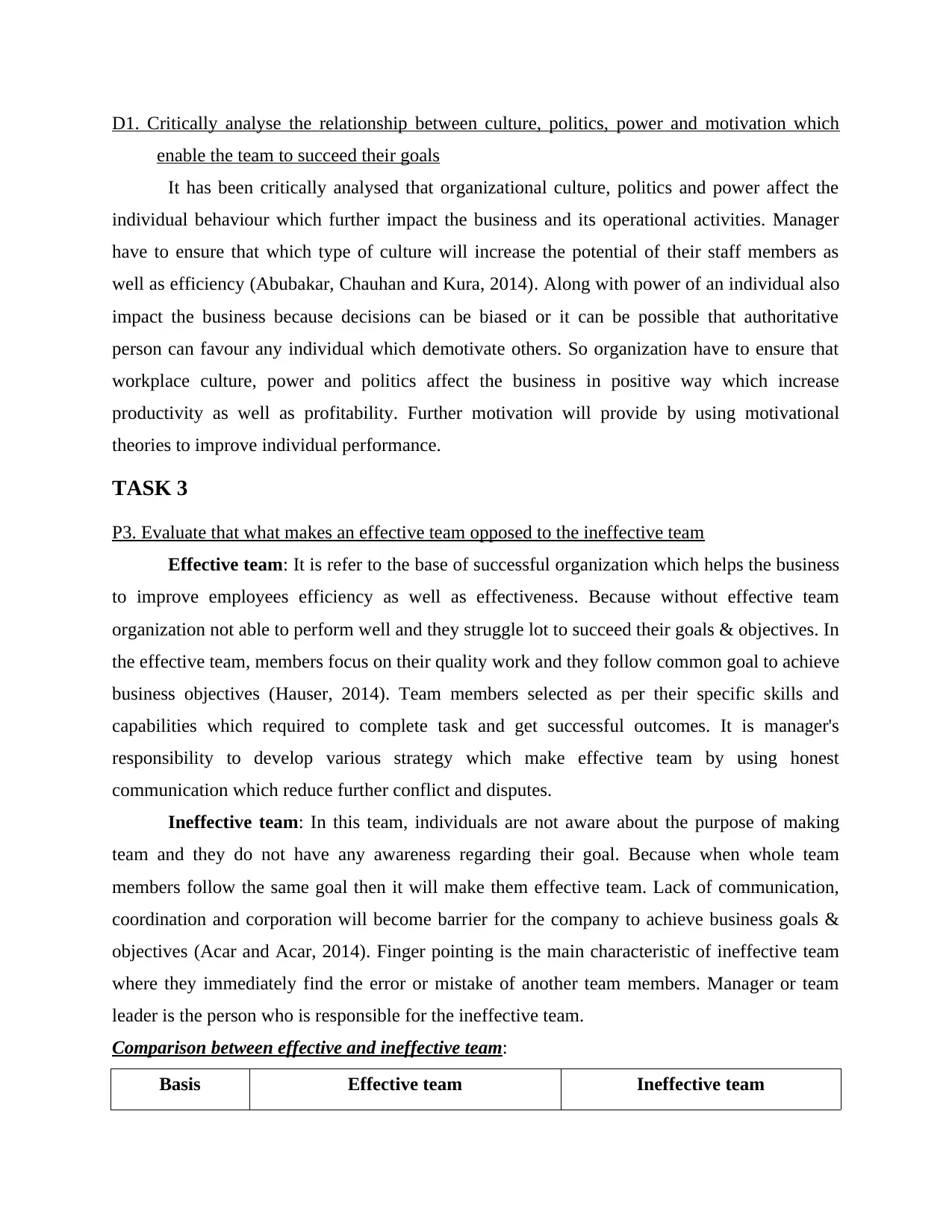
D1. Critically analyse the relationship between culture, politics, power and motivation which
enable the team to succeed their goals
It has been critically analysed that organizational culture, politics and power affect the
individual behaviour which further impact the business and its operational activities. Manager
have to ensure that which type of culture will increase the potential of their staff members as
well as efficiency (Abubakar, Chauhan and Kura, 2014). Along with power of an individual also
impact the business because decisions can be biased or it can be possible that authoritative
person can favour any individual which demotivate others. So organization have to ensure that
workplace culture, power and politics affect the business in positive way which increase
productivity as well as profitability. Further motivation will provide by using motivational
theories to improve individual performance.
TASK 3
P3. Evaluate that what makes an effective team opposed to the ineffective team
Effective team: It is refer to the base of successful organization which helps the business
to improve employees efficiency as well as effectiveness. Because without effective team
organization not able to perform well and they struggle lot to succeed their goals & objectives. In
the effective team, members focus on their quality work and they follow common goal to achieve
business objectives (Hauser, 2014). Team members selected as per their specific skills and
capabilities which required to complete task and get successful outcomes. It is manager's
responsibility to develop various strategy which make effective team by using honest
communication which reduce further conflict and disputes.
Ineffective team: In this team, individuals are not aware about the purpose of making
team and they do not have any awareness regarding their goal. Because when whole team
members follow the same goal then it will make them effective team. Lack of communication,
coordination and corporation will become barrier for the company to achieve business goals &
objectives (Acar and Acar, 2014). Finger pointing is the main characteristic of ineffective team
where they immediately find the error or mistake of another team members. Manager or team
leader is the person who is responsible for the ineffective team.
Comparison between effective and ineffective team:
Basis Effective team Ineffective team
enable the team to succeed their goals
It has been critically analysed that organizational culture, politics and power affect the
individual behaviour which further impact the business and its operational activities. Manager
have to ensure that which type of culture will increase the potential of their staff members as
well as efficiency (Abubakar, Chauhan and Kura, 2014). Along with power of an individual also
impact the business because decisions can be biased or it can be possible that authoritative
person can favour any individual which demotivate others. So organization have to ensure that
workplace culture, power and politics affect the business in positive way which increase
productivity as well as profitability. Further motivation will provide by using motivational
theories to improve individual performance.
TASK 3
P3. Evaluate that what makes an effective team opposed to the ineffective team
Effective team: It is refer to the base of successful organization which helps the business
to improve employees efficiency as well as effectiveness. Because without effective team
organization not able to perform well and they struggle lot to succeed their goals & objectives. In
the effective team, members focus on their quality work and they follow common goal to achieve
business objectives (Hauser, 2014). Team members selected as per their specific skills and
capabilities which required to complete task and get successful outcomes. It is manager's
responsibility to develop various strategy which make effective team by using honest
communication which reduce further conflict and disputes.
Ineffective team: In this team, individuals are not aware about the purpose of making
team and they do not have any awareness regarding their goal. Because when whole team
members follow the same goal then it will make them effective team. Lack of communication,
coordination and corporation will become barrier for the company to achieve business goals &
objectives (Acar and Acar, 2014). Finger pointing is the main characteristic of ineffective team
where they immediately find the error or mistake of another team members. Manager or team
leader is the person who is responsible for the ineffective team.
Comparison between effective and ineffective team:
Basis Effective team Ineffective team
⊘ This is a preview!⊘
Do you want full access?
Subscribe today to unlock all pages.

Trusted by 1+ million students worldwide
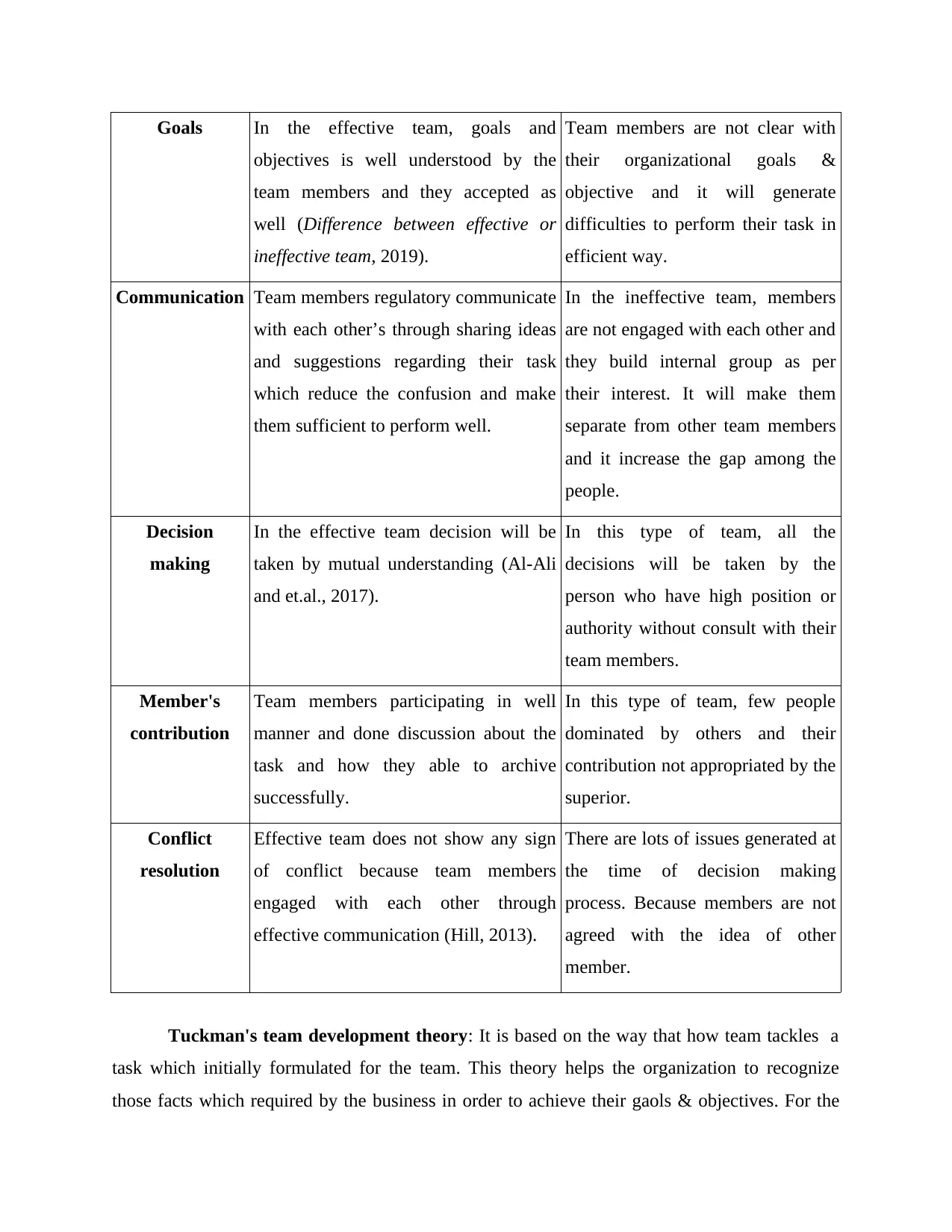
Goals In the effective team, goals and
objectives is well understood by the
team members and they accepted as
well (Difference between effective or
ineffective team, 2019).
Team members are not clear with
their organizational goals &
objective and it will generate
difficulties to perform their task in
efficient way.
Communication Team members regulatory communicate
with each other’s through sharing ideas
and suggestions regarding their task
which reduce the confusion and make
them sufficient to perform well.
In the ineffective team, members
are not engaged with each other and
they build internal group as per
their interest. It will make them
separate from other team members
and it increase the gap among the
people.
Decision
making
In the effective team decision will be
taken by mutual understanding (Al-Ali
and et.al., 2017).
In this type of team, all the
decisions will be taken by the
person who have high position or
authority without consult with their
team members.
Member's
contribution
Team members participating in well
manner and done discussion about the
task and how they able to archive
successfully.
In this type of team, few people
dominated by others and their
contribution not appropriated by the
superior.
Conflict
resolution
Effective team does not show any sign
of conflict because team members
engaged with each other through
effective communication (Hill, 2013).
There are lots of issues generated at
the time of decision making
process. Because members are not
agreed with the idea of other
member.
Tuckman's team development theory: It is based on the way that how team tackles a
task which initially formulated for the team. This theory helps the organization to recognize
those facts which required by the business in order to achieve their gaols & objectives. For the
objectives is well understood by the
team members and they accepted as
well (Difference between effective or
ineffective team, 2019).
Team members are not clear with
their organizational goals &
objective and it will generate
difficulties to perform their task in
efficient way.
Communication Team members regulatory communicate
with each other’s through sharing ideas
and suggestions regarding their task
which reduce the confusion and make
them sufficient to perform well.
In the ineffective team, members
are not engaged with each other and
they build internal group as per
their interest. It will make them
separate from other team members
and it increase the gap among the
people.
Decision
making
In the effective team decision will be
taken by mutual understanding (Al-Ali
and et.al., 2017).
In this type of team, all the
decisions will be taken by the
person who have high position or
authority without consult with their
team members.
Member's
contribution
Team members participating in well
manner and done discussion about the
task and how they able to archive
successfully.
In this type of team, few people
dominated by others and their
contribution not appropriated by the
superior.
Conflict
resolution
Effective team does not show any sign
of conflict because team members
engaged with each other through
effective communication (Hill, 2013).
There are lots of issues generated at
the time of decision making
process. Because members are not
agreed with the idea of other
member.
Tuckman's team development theory: It is based on the way that how team tackles a
task which initially formulated for the team. This theory helps the organization to recognize
those facts which required by the business in order to achieve their gaols & objectives. For the
Paraphrase This Document
Need a fresh take? Get an instant paraphrase of this document with our AI Paraphraser
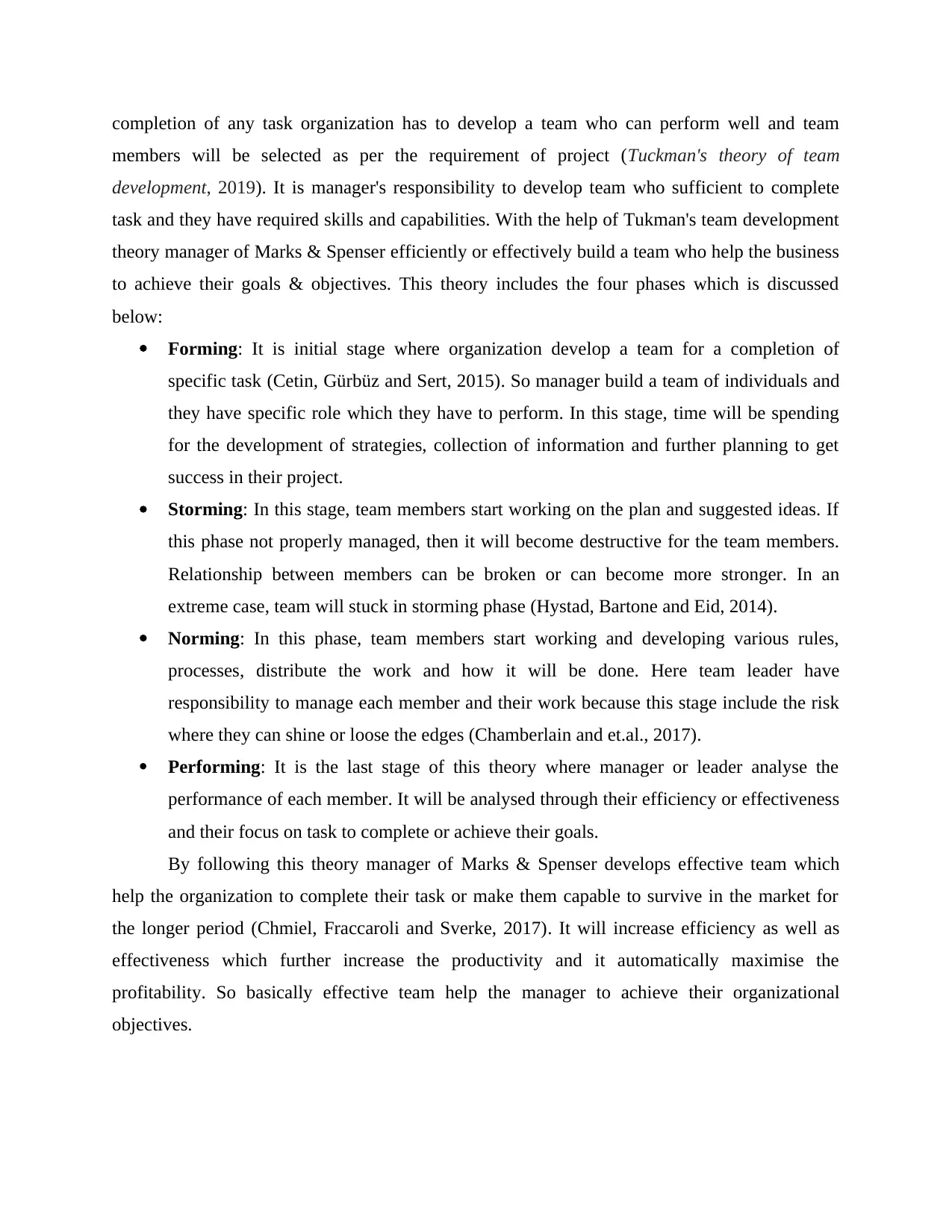
completion of any task organization has to develop a team who can perform well and team
members will be selected as per the requirement of project (Tuckman's theory of team
development, 2019). It is manager's responsibility to develop team who sufficient to complete
task and they have required skills and capabilities. With the help of Tukman's team development
theory manager of Marks & Spenser efficiently or effectively build a team who help the business
to achieve their goals & objectives. This theory includes the four phases which is discussed
below:
Forming: It is initial stage where organization develop a team for a completion of
specific task (Cetin, Gürbüz and Sert, 2015). So manager build a team of individuals and
they have specific role which they have to perform. In this stage, time will be spending
for the development of strategies, collection of information and further planning to get
success in their project.
Storming: In this stage, team members start working on the plan and suggested ideas. If
this phase not properly managed, then it will become destructive for the team members.
Relationship between members can be broken or can become more stronger. In an
extreme case, team will stuck in storming phase (Hystad, Bartone and Eid, 2014).
Norming: In this phase, team members start working and developing various rules,
processes, distribute the work and how it will be done. Here team leader have
responsibility to manage each member and their work because this stage include the risk
where they can shine or loose the edges (Chamberlain and et.al., 2017).
Performing: It is the last stage of this theory where manager or leader analyse the
performance of each member. It will be analysed through their efficiency or effectiveness
and their focus on task to complete or achieve their goals.
By following this theory manager of Marks & Spenser develops effective team which
help the organization to complete their task or make them capable to survive in the market for
the longer period (Chmiel, Fraccaroli and Sverke, 2017). It will increase efficiency as well as
effectiveness which further increase the productivity and it automatically maximise the
profitability. So basically effective team help the manager to achieve their organizational
objectives.
members will be selected as per the requirement of project (Tuckman's theory of team
development, 2019). It is manager's responsibility to develop team who sufficient to complete
task and they have required skills and capabilities. With the help of Tukman's team development
theory manager of Marks & Spenser efficiently or effectively build a team who help the business
to achieve their goals & objectives. This theory includes the four phases which is discussed
below:
Forming: It is initial stage where organization develop a team for a completion of
specific task (Cetin, Gürbüz and Sert, 2015). So manager build a team of individuals and
they have specific role which they have to perform. In this stage, time will be spending
for the development of strategies, collection of information and further planning to get
success in their project.
Storming: In this stage, team members start working on the plan and suggested ideas. If
this phase not properly managed, then it will become destructive for the team members.
Relationship between members can be broken or can become more stronger. In an
extreme case, team will stuck in storming phase (Hystad, Bartone and Eid, 2014).
Norming: In this phase, team members start working and developing various rules,
processes, distribute the work and how it will be done. Here team leader have
responsibility to manage each member and their work because this stage include the risk
where they can shine or loose the edges (Chamberlain and et.al., 2017).
Performing: It is the last stage of this theory where manager or leader analyse the
performance of each member. It will be analysed through their efficiency or effectiveness
and their focus on task to complete or achieve their goals.
By following this theory manager of Marks & Spenser develops effective team which
help the organization to complete their task or make them capable to survive in the market for
the longer period (Chmiel, Fraccaroli and Sverke, 2017). It will increase efficiency as well as
effectiveness which further increase the productivity and it automatically maximise the
profitability. So basically effective team help the manager to achieve their organizational
objectives.
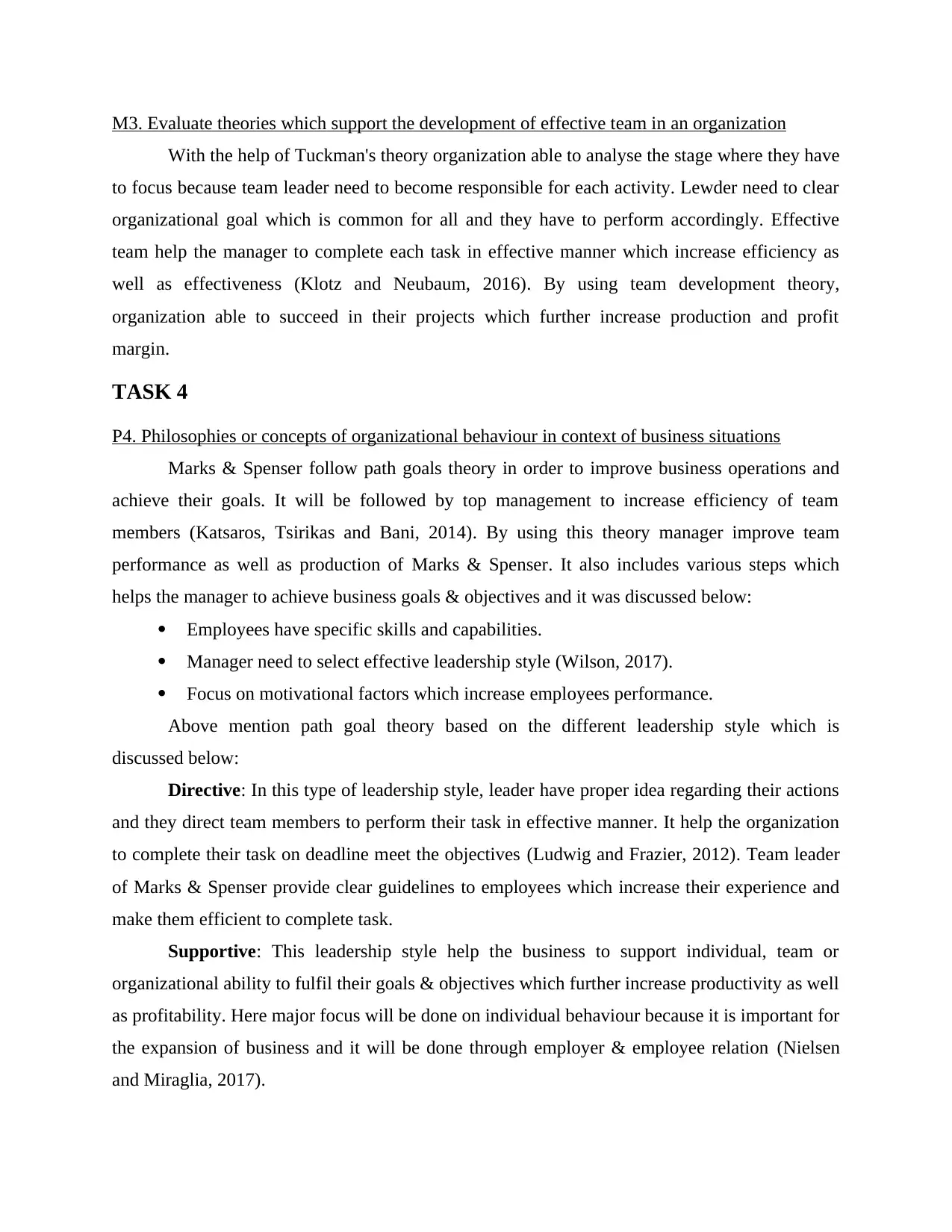
M3. Evaluate theories which support the development of effective team in an organization
With the help of Tuckman's theory organization able to analyse the stage where they have
to focus because team leader need to become responsible for each activity. Lewder need to clear
organizational goal which is common for all and they have to perform accordingly. Effective
team help the manager to complete each task in effective manner which increase efficiency as
well as effectiveness (Klotz and Neubaum, 2016). By using team development theory,
organization able to succeed in their projects which further increase production and profit
margin.
TASK 4
P4. Philosophies or concepts of organizational behaviour in context of business situations
Marks & Spenser follow path goals theory in order to improve business operations and
achieve their goals. It will be followed by top management to increase efficiency of team
members (Katsaros, Tsirikas and Bani, 2014). By using this theory manager improve team
performance as well as production of Marks & Spenser. It also includes various steps which
helps the manager to achieve business goals & objectives and it was discussed below:
Employees have specific skills and capabilities.
Manager need to select effective leadership style (Wilson, 2017).
Focus on motivational factors which increase employees performance.
Above mention path goal theory based on the different leadership style which is
discussed below:
Directive: In this type of leadership style, leader have proper idea regarding their actions
and they direct team members to perform their task in effective manner. It help the organization
to complete their task on deadline meet the objectives (Ludwig and Frazier, 2012). Team leader
of Marks & Spenser provide clear guidelines to employees which increase their experience and
make them efficient to complete task.
Supportive: This leadership style help the business to support individual, team or
organizational ability to fulfil their goals & objectives which further increase productivity as well
as profitability. Here major focus will be done on individual behaviour because it is important for
the expansion of business and it will be done through employer & employee relation (Nielsen
and Miraglia, 2017).
With the help of Tuckman's theory organization able to analyse the stage where they have
to focus because team leader need to become responsible for each activity. Lewder need to clear
organizational goal which is common for all and they have to perform accordingly. Effective
team help the manager to complete each task in effective manner which increase efficiency as
well as effectiveness (Klotz and Neubaum, 2016). By using team development theory,
organization able to succeed in their projects which further increase production and profit
margin.
TASK 4
P4. Philosophies or concepts of organizational behaviour in context of business situations
Marks & Spenser follow path goals theory in order to improve business operations and
achieve their goals. It will be followed by top management to increase efficiency of team
members (Katsaros, Tsirikas and Bani, 2014). By using this theory manager improve team
performance as well as production of Marks & Spenser. It also includes various steps which
helps the manager to achieve business goals & objectives and it was discussed below:
Employees have specific skills and capabilities.
Manager need to select effective leadership style (Wilson, 2017).
Focus on motivational factors which increase employees performance.
Above mention path goal theory based on the different leadership style which is
discussed below:
Directive: In this type of leadership style, leader have proper idea regarding their actions
and they direct team members to perform their task in effective manner. It help the organization
to complete their task on deadline meet the objectives (Ludwig and Frazier, 2012). Team leader
of Marks & Spenser provide clear guidelines to employees which increase their experience and
make them efficient to complete task.
Supportive: This leadership style help the business to support individual, team or
organizational ability to fulfil their goals & objectives which further increase productivity as well
as profitability. Here major focus will be done on individual behaviour because it is important for
the expansion of business and it will be done through employer & employee relation (Nielsen
and Miraglia, 2017).
⊘ This is a preview!⊘
Do you want full access?
Subscribe today to unlock all pages.

Trusted by 1+ million students worldwide
1 out of 17
Related Documents
Your All-in-One AI-Powered Toolkit for Academic Success.
+13062052269
info@desklib.com
Available 24*7 on WhatsApp / Email
![[object Object]](/_next/static/media/star-bottom.7253800d.svg)
Unlock your academic potential
Copyright © 2020–2026 A2Z Services. All Rights Reserved. Developed and managed by ZUCOL.

